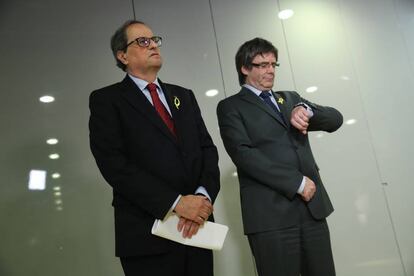Learning from the past
The government needs to respond to the new secessionist push with all the power of the law

The fact that the secessionist challenge in Catalonia went so far during the last political term was, in large part, due to the fact that the central government in Madrid acted late, and badly. Prime Minister Mariano Rajoy, of the Popular Party (PP), trusted that the Constitutional Court would be able to prevent the breach of the Spanish Constitution and Catalonia’s own regional Statute. At the same time, he trusted that the intervention of Catalonia’s finances, combined with prevention measures taken by the state’s security forces, would stop the illegal referendum called for October 1 from taking place.
As we know, the government made two mistakes, as the ballot boxes made it to the polling stations on that day, while the National Police and Civil Guard were not only unable to stop voting from taking place, but also managed to seriously damage Spain’s image abroad. In the end, given the refusal of then-regional premier Carles Puigdemont to dissolve the Catalan parliament and call elections, the central government resorted to the Senate, requesting the application of Article 155 of the Spanish Constitution in order to sack the Catalan Cabinet, dissolve parliament and call early elections.
The powers of democracy should show that they have learned from past mistakes made and are prepared to act firmly and speedily
With Article 155, combined with action by the Spanish courts, the pro-independence movement was stopped in its tracks. The unity of the country’s political forces, widespread rejection from citizens, and the firm opposition of European partners and institutions also did their part to block these unilateral moves and breaches of the law.
Nothing in the fight against the secessionist challenge has been easy. That is why today, while a new premier, Quim Torra, takes up his role after stating that his intention is go down the unilateral and illegal path again, if anything with greater impetus, the powers of democracy and democrats themselves should show that they have learned from the mistakes of the past and that, as a result, they are prepared to act firmly and speedily, to ensure that the secessionists are unable to produce, even minimally, a new challenge to the state.
The Spanish prime minister cannot make mistakes a second time, by opting to wait and trusting everything, once more, to the courts. Where earlier he acted late and badly, now he should take action early and with all of the legal means at his disposal, which are many and varied. As well as closely controlling the region’s finances, he can also assume control of the regional police force, the Mossos d’Esquadra, to ensure that its ability to enforce the Constitution is not annulled, as it was in the past.
And if he were to lack these means, or if these proved to be insufficient as deterrents, he should go to parliament in order to garner the support of the chamber for a political and legislative plan – including a possible modification of the criminal code – that would impede the new Catalan government from once again breaking the law.
The remainder of Spain’s political forces must give their support to Prime Minister Rajoy, but it falls to him to lead the way, calling together as soon as possible the heads of the four main parties, with the aim of offering a genuine image of unity, without any political calculations.
English version by Simon Hunter.
Tu suscripción se está usando en otro dispositivo
¿Quieres añadir otro usuario a tu suscripción?
Si continúas leyendo en este dispositivo, no se podrá leer en el otro.
FlechaTu suscripción se está usando en otro dispositivo y solo puedes acceder a EL PAÍS desde un dispositivo a la vez.
Si quieres compartir tu cuenta, cambia tu suscripción a la modalidad Premium, así podrás añadir otro usuario. Cada uno accederá con su propia cuenta de email, lo que os permitirá personalizar vuestra experiencia en EL PAÍS.
¿Tienes una suscripción de empresa? Accede aquí para contratar más cuentas.
En el caso de no saber quién está usando tu cuenta, te recomendamos cambiar tu contraseña aquí.
Si decides continuar compartiendo tu cuenta, este mensaje se mostrará en tu dispositivo y en el de la otra persona que está usando tu cuenta de forma indefinida, afectando a tu experiencia de lectura. Puedes consultar aquí los términos y condiciones de la suscripción digital.








































